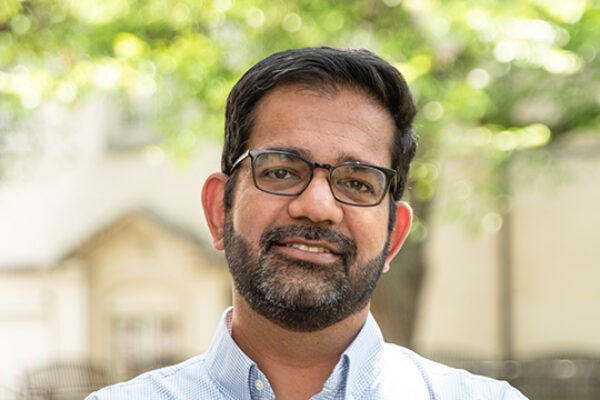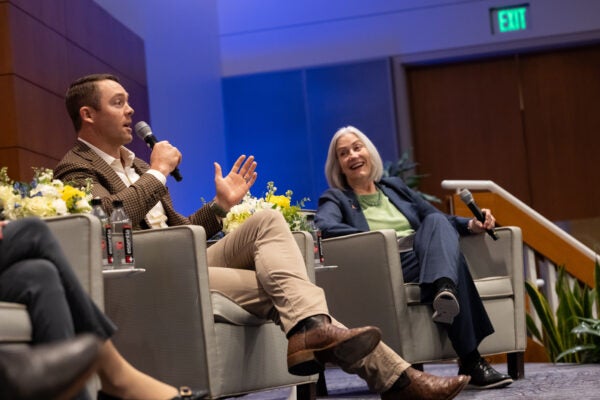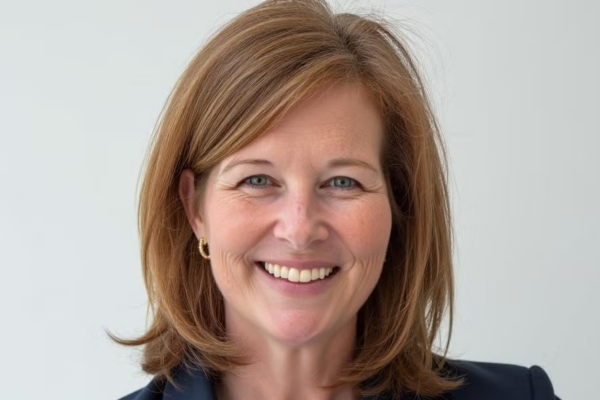The McCombs Gift
An oral history of the largest gift in UT history: who dreamed big, how Red came on board, and how it was celebrated.
By Mary Ann Roser
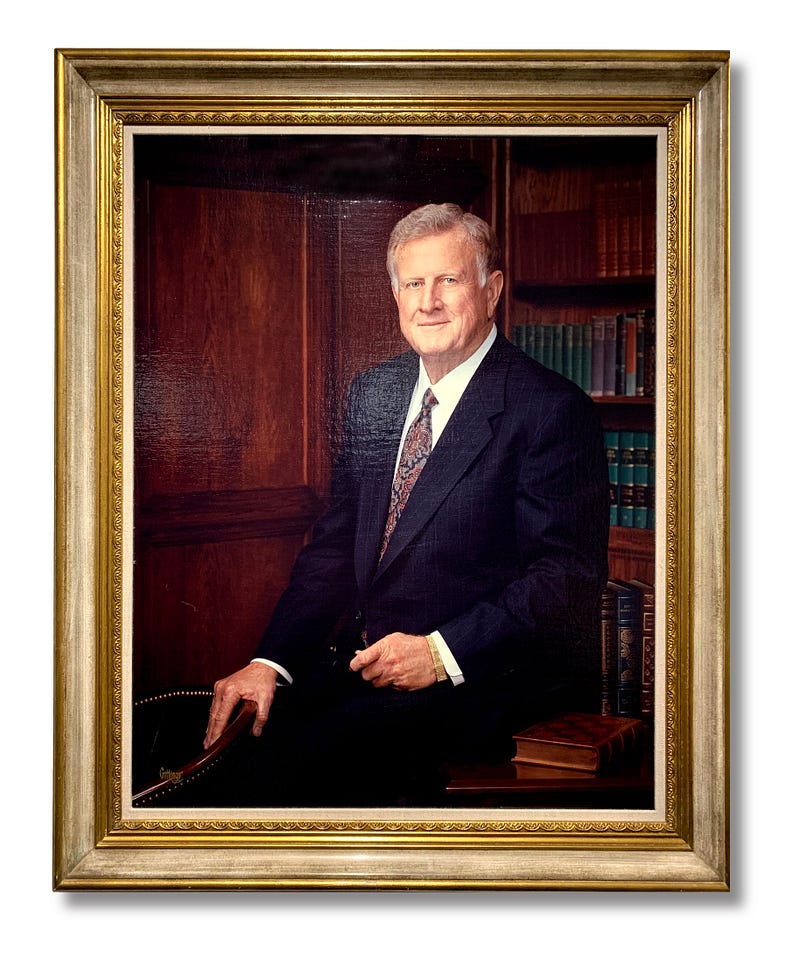
Since Red McCombs gave a record-setting $50 million to The University of Texas business school in 2000, the transformative power of that donation from the school’s namesake has become the gift keeps on giving.
At the time, it was the largest single donation UT had received in its then-117-year history. “We had donors who had given more, but not all in one shot,” says Larry Faulkner, who was then UT president. The gift also tied with Arkansas for the largest public business school endowment in the country, according to then-Dean Bob May.
McCombs’ unprecedented gift marked the first time UT named a school for a donor. And it has had the “Texas-sized impact” that Faulkner predicted it would have the day he helped announce it, May 11, 2000.
The story of how the gift came about, was celebrated, and changed the business school also is larger than life.
To set the stage, UT had launched its first $1 billion campaign in 1997, not long after May became dean and a year before Faulkner became president. The business school hoped to land a large donor, and May made a list of billionaire graduates.
“He basically was like a great fish that jumps in your boat, although there was a lot of fishing that went on in between,” May says. The alumni award “was just an incredibly fortunate event, and I spent a lot of my time for about two or three months basically creating a relationship between Red McCombs and what is now the McCombs School of Business.”
May began writing letters to McCombs, and he invited McCombs to speak to students at the business school, an encounter that left McCombs “glowing,” as May says.
May then told Faulkner he thought McCombs might be a willing donor, and Faulkner said he had already planned to see McCombs in San Antonio in two weeks. Faulkner agreed to do “the ask” for $50 million and says the visit optimistic the San Antonio businessman and then-owner of the Minnesota Vikings would say yes.
“He believes passionately in his community and in Texas,” Faulkner says. “He believes it can succeed at a better level and he’s looking for a way to get it to do that.”
At the announcement, McCombs, who attended the business school in the late 1940s but did not graduate, said he had no second thoughts about making the gift — without any strings attached. Unrestrained gifts are unusual for donors, but McCombs said at the announcement ceremony: “I believe strongly in the quality of leadership at The University of Texas, or I wouldn’t be making this gift. The Texas Business School is already a great school. … My gift is about creating new opportunities.”
“My hope is that this gift will allow the school to be one of the very best in the world, period.”
The Red McCombs Stewardship Report, a 44-page business school report on the gift’s impact during its first decade, said, “In 2000, the school had so few faculty members for its size that it just barely met the minimum faculty standards for business accreditation.”
With McCombs’ gift, the school was able to recruit and retain star-quality faculty members, holding them with more resources, including summer grants to pursue research and other work. It enabled the school to attract top-notch students and offer scholarships to lower-income students. And, as faculty and student quality rose, more household-name corporations came knocking to hire graduates and deepen ties with the school.
McCombs’ generosity also inspired other donors. (Todd — do you have information to add here on this?)
With a big evening celebration accompanying the school’s festive campus announcement earlier in the day, the McCombs School began carrying out its benefactor’s vision. To mark the 20th anniversary, we interviewed key individuals who were involved and others who benefited from McCombs generosity. They are:
Red McCombs (all comments below are excerpts from his book, Big Red: Memoirs of a Texas Entrepreneur and Philanthropist)
Larry Faulkner, President Emeritus of UT Austin
William C. Cunningham, James L. Bayless Chair for Free Enterprise and former UT System Chancellor
Lee Bash, former Director of Events, UT Austin
Jay Hartzell, President, UT Austin
Bob May, former Dean of the McCombs School of Business
John Sibley Butler, J. Marion West Chair for Constructive Capitalism, Department of Management, Graduate School of Business
Vijay Mahajan, John P. Harbin Centennial Chair in Business
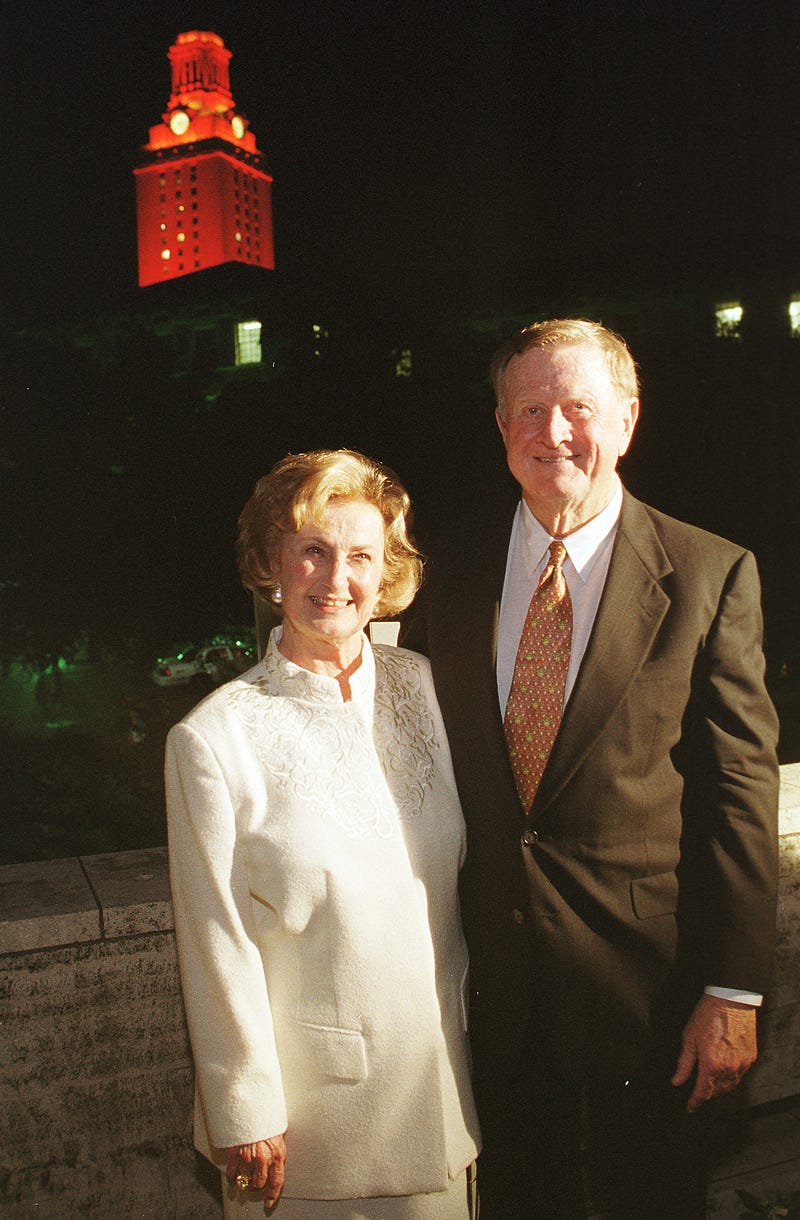
What do you remember about the gift announcement? Was there a lot of hoopa?
McCombs: At the May 11 press conference, my emotions ran high. I told the students at the press conference that, aside from my family, everything else I have ever been involved with in my life paled beside this. It was truly the defining moment of my life.
Butler: We had a great party. I think I was sitting with Red. We are dear friends. What I remember is a gala in the grand Texas tradition. And I remember Bob May being very, very gracious and Red saying it was not a gift, it was an investment in the future of Texas. He was doing this for Texas and the students. It was a great day for me to be associated with it.
Bash: We were charged with producing an event for both the students, faculty, and staff of the business school, and then a more private dinner with Red and a certain group of people. …
For the student event, we held it on the plaza of Gregory Gym, and … there was a cast of thousands with many students — Longhorn Band. Of course, Dean May spoke. President Faulkner spoke. Red McCombs spoke. I can’t remember who else spoke, but I remember it was a very joyous occasion, a lot of energy, a lot of students. It was just a lot of fun.
Larry Faulkner: We held (the dinner) on the second level of what was then the graduate school of business. The balcony points toward the tower. We did this at dusk, and we arranged for an electric button to be put on the wall of the balcony so Red could come out and turn the tower orange.
Bash: I called over there (to the physical plant) and asked them, could they build me a box with a lever on it that we could install over the business school, where the donor will pull the lever, and then we, as we pull the lever, we’ll turn the tower orange. They said, “Sure.” So, they built this lovely box out of like an electrical box panel thing with a big lever on the side, and with a big long cable that came out of the back of it, and came over and installed it on the balcony. The cable didn’t go anywhere. It was totally fake. … I thought the lever they’re going to make was going to be silly-looking and my first thought, “Wow, that looks serious. That looks like a real lever that would really do something.” Someone had the very smart idea that when you pull the lever down, it locked in place. So, Red couldn’t think he could flash the tower orange light back and forth.
Faulkner: (Development official) Frank Schubert was watching and was on a cell phone to the guy who had the switch. And when he said, “Now,” the tower was lit. Red didn’t know (it was fake). Everyone was filing off the balcony, when I petrified the development people (laughs). I said to Red, “Do you want to turn it off?” And he said, “No, let’s leave it on.”
Cunningham: I said to Red, “I knew it was you,” even though I had no inside information (and was no longer chancellor). I said, “You are one of the few people who has the interest and the capacity to make this gift.” He understands what a difference the McCombs School of Business could make in the lives of students.
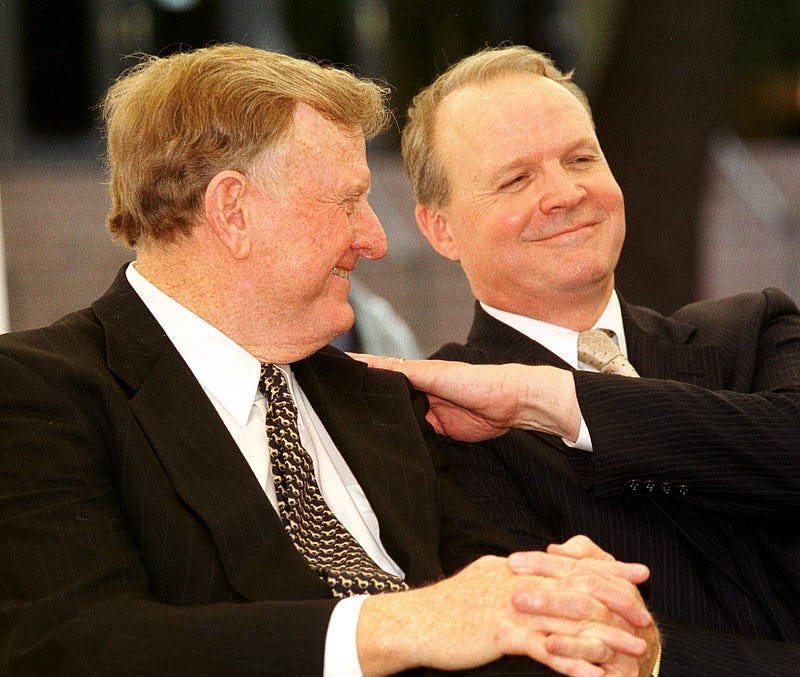
How did this gift come about? What was McCombs’ motivation?
Faulkner: We were in the midst of our first $1 billion campaign … (and) thought $50 million was the number needed. So, I talked to him about what it would do for Texas. Red has a strong sense of community and citizenship, and he’s a very competitive guy. That fits with his interest in sports and sports franchises. He’s always been interested in competition in a sports setting, and he’s also interested in competition in an academic setting. I appealed to his interest in the standing and capabilities of what Texas is and what the University of Texas could be and how well it could compete. Those were themes I talked to him about it.
By the way, I did ask one other donor for $50 million, and I thought he would become apoplectic. He just gagged. But Red didn’t gag.
McCombs: Since the gift I had in mind was so large, I called my family together for their guidance. I didn’t make any big presentation about it. But almost before I could get it out of my mouth, they were saying, “Dad, go for it, that will be great!” With that rousing endorsement, I set in motion my proposal to give $50 million in cash, completely unrestricted, over the next seven years.
Cunningham: Red has always been concerned about the young people of Texas. He has always understood the importance of having first-class institutions and first-class organizations, but he saw this as an investment. I’ve known Red a long time. When I was chancellor, I used to visit with Red McCombs. If we needed advice, he was the man we went to see.
May: One of the wonderful things that I learned about Red McCombs is he really cares about students. Every time there was an opportunity for him to speak to an audience of students, he just lit up, and he was a wonderful inspirational speaker.
McCombs: Charline and I make philanthropic decisions based on the same two questions we ask of every proposal: “How great is the need?” and “What will be the impact of the gift?”
One of the reasons I chose the School of Business for this gift was because of the influence its greatest dean had on me. That dean was the late George Kozmetsky. … The university brought George Kozmetsky to campus in 1966 to take the School of Business to a new level, which he more than accomplished during his sixteen years as dean. … My name may be on the School of Business, but it has Kozmetsky’s stamp on every department and program.
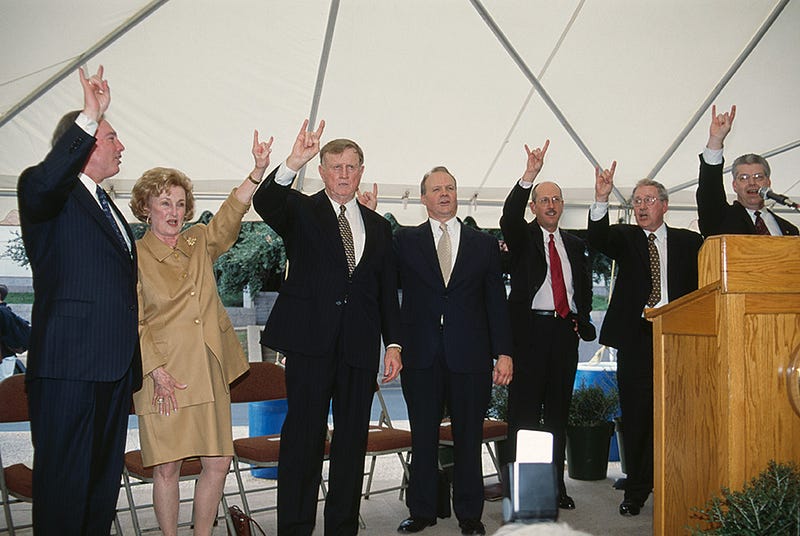
What did his gift mean for the business school and The University of Texas?
Cunningham: The University of Texas at Austin and the College of Business had been on a long march to become one of the great public universities in the country. The McCombs gift was a game-changer.
It immediately provided resources and put the school on a new trajectory. There were things we could do the next year that we couldn’t have done before, like faculty recruitment, student recruitment, summer stipends. All of that. This put us on a different level. And it’s a beautiful example of a gift that continues to give. It continues to provide a stream of resources the business school wouldn’t have had otherwise.
Faulkner: It provided resources that allowed the business school to move its programs into the highest level of competition nationally.
Hartzell: As an engine for human capital and change around business, I think this place has had more and more reach and impact. … If we make a faculty offer now, we’re more confident that when we go out to hire a professor, we’re going to be able to beat certain schools than we were 20 years ago, which is a great place to be in.
Butler: George Kozmetsky came here and set the standards for a first-class business school. George said we’re going to do business, but business starts with science. Red McCombs would tell you the influence George had on him. The whole school was changing from a regional school to a big research university, and Red McCombs’ gift allowed the business school to scale nationally and internationally. I joined the faculty in 1974, and it has been amazing to me to watch it go from a s school with no prestige to a major national university.
Mahajan: We were a nationally known school, but it’s a moving target. We had to stay very competitive or we would have been left behind. It definitely helped us stay competitive. Red opened many doors for us.
Hartzell: Just in the market for faculty, there’s no way we compete without the resource base we have now, from just being able to pay what we pay in the market. … We have learned I think as a university, but certainly as a school, the power of the match as a motive. We’re still using that technique now. … Red, to my mind, really set the stage for what this match could do to help galvanize broad support.
McCombs: I believe that business is the core of society. Whether you practice business or any other profession, or you’re involved in a church or a non-profit, if it’s going to reach its ultimate level, there has to be a core business involved in the entity, helping it to grow and stretch its vision. From planning, to fundraising, to financing and operating, there is a business at the heart of every organization. And that is precisely why I made that gift to the business school.
Butler: That money from McCombs allowed us to get national and international acclaim and allowed us to stick our chest out. When you say UT-Austin McCombs, our undergraduates can hang, our MBAs can hang.
Did the donation help you in any way?
Hartzell: I was leaving, arguably, one of the top five finance departments in the country at NYU to come here, and I would have not come here if I didn’t think the future was right here, even though it was home to me. … The McCombs (gift) is a large part of what made me more willing to come here and take a chance.
Butler: What Red’s gift did was put you on par with faculty who could do research and teach. It provided grants to faculty, and it raised the whole profile of the business school and let those other business school SOBs know we’re coming.
Mahajan: It was used for matching money, and I also benefited from that. An endowment in the management department was established in the name of Milton Schoeman. I was his PhD student in the management department, and he recruited me. And the matching money was used to help PhD students — to attend conferences and buy computers and data.
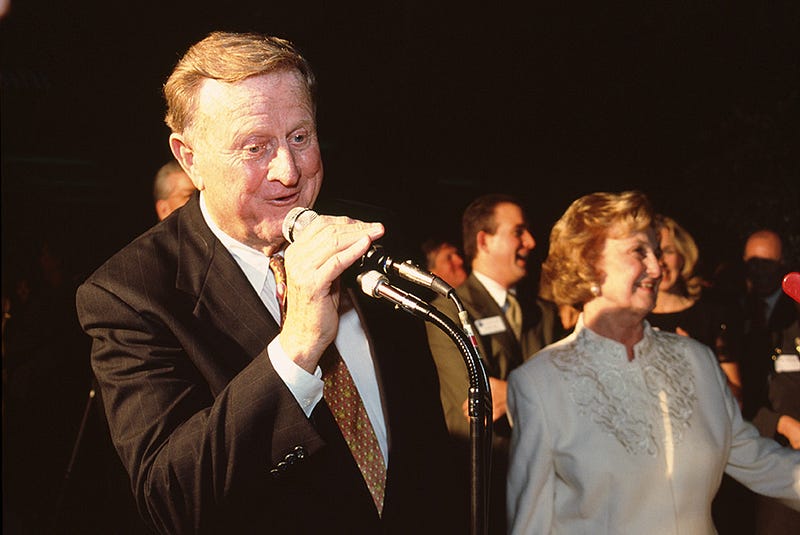
Was it unusual to name the school for a donor?
Faulkner: It wasn’t too controversial. We did develop an actual policy on naming colleges as a result of that ask. It was developed in advance. We went through all the conversations that were required. We talked about the standing of the individual and the size of the gift. I actually prepared guidelines that the regents accepted. Lots of business schools in the United States had been named (for business donors). The prominent ones were all named.
Mahajan: I don’t think there was anything negative about it, but other people wondered why are they naming it for someone is who is not a professor or provost? At the end of the day, the school depends on the quality of the faculty you are able to recruit, the quality of the students, and the quality of the companies that come to recruit here. Everybody was happy we got the $50 million.
Hartzell: Being named was exceptional. That was a huge signal of what the trajectory of the school would probably look like because of that investment. … I think it was to signal the future.
McCombs: It would never have even entered my mind that there would be any possibility that the UT School of Business could become the Red McCombs School of Business, even with all of my ego and love for the school. It was something that just dawned on me as I assisted UT President Larry Faulkner and Dean Bob Mary with the university’s capital campaign. Our discussions centered on how to make people more aware of the business school’s quality and impact and how to take it to the next level of achievement. We eventually came to the conclusion that we needed a heavy hitter — a donor the caliber of which the school had never seen.
Aside from making the business school more competitive, how else did the gift impact the school?
Mahajan: It sent signals to other donors: Come and help. It got leveraged that way.
Faulkner: It provided credibility and momentum to that (billion dollar) campaign. It’s striking to me that it’s 20 years already, but I think the record of achievement of the McCombs School in the last 20 years illustrates the power of the gift. We can all be grateful to Red and Charline for that.
Hartzell: I think it probably raised all of our sights and made us behave more aspirationally, more aggressively. I think knowing that it was there and the resource it provides, but also just there in spirit, helps people think more of what’s possible.
Mahajan: The quality of our students is second to none. We have a phenomenal reputation. All the high-tech companies come here to recruit. We have the top MBA students. Companies also come here because they see quality, and when they come they see the facilities and quality of executive education. The quality of the companies that are coming here has gone up. The Amazons, the Apples. … A gift like this is truly a blessing.
McCombs: I have been very happy with the progress that the McCombs School has made these last few years. It pleases me to think that the additional resources that I have provided may have made a significant contribution to that progress. … The University of Texas has given me many honors, including a Distinguished Alumnus Award in 1998, and it has seen fit to place my name and Charline’s name on buildings and programs on campus. But the greatest honor for both of us has been our close and continuing association with the leaders, faculty, and students of one of the greatest institutions of higher learning in the United States.
About this Post
Share:
